Economic Justice
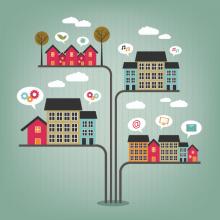
The Christian Community Development Association (CCDA) has been a powerful force for Christian social action over the past decade. CCDA's leadership development, resources, and vision have been powerfully focused on helping pastors and community leaders facilitate the restoration of communities all over the country and around the world.
Born out of the traditions of the civil rights movement, CCDA is now engaging a new generation of pastors, prophets, and ministers. This next generation of CCDA will naturally look somewhat different from previous generations as they respond to the ever-changing landscape of our society. As it turns out, one major difference is a hunger among leaders for a more robust and powerful theological foundation from which to pursue ministry.
Practics has long dominated the field of Christian social action. What works? What strategies and techniques will actually bring about change in our community? These have been the central questions of past generations. However, among a new generation of church and community leaders, practical questions are not the sole concern, and in some cases not even the primary concern.
Speak out for those who cannot speak,
for the rights of all the destitute.
Speak out, judge righteously,
defend the rights of the poor and needy.
~ Proverbs 31:8-9
ADDIS ABABA — These words of King Solomon have been running through my mind since our ONE Moms delegation — 13 mothers from the United States, the United Kingdom, and France — arrived in the Ethiopian capital on Sunday.
I hear these verses as a clarion call to action. As someone who strives humbly to follow the Way of Jesus and be involved in The Work that God is doing in the world, I want to respond and do what these verses command.
And as a believer who also happens to be a mother (a fairly novice one, still learning the ropes, if you will), I must do.
Sunday afternoon, after us ONE Moms dropped our luggage at the hotel, piled into our chartered bus, and drove to the outskirts of the city to the Mary Joy Aid Through Development Association, we met our Ethiopian sisters who are speaking out for those who cannot; who are advocating on behalf of the destitute, judging with righteous wisdom, and defending the rights of the poor and the needy.
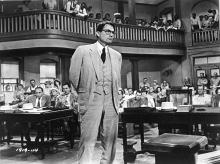
September 30 - October 6 was Banned Books Week, an annual event that celebrates the freedom to read.
Surprisingly, Harper Lee's novel To Kill A Mockingbird makes the list of frequently banned books.
To Kill A Mockingbird changed my life.
"You never really understand a person until you consider things from his point of view," says Harper Lee through Atticus, "until you climb into his skin and walk around in it."
How much have I learned as a teacher and a writer by thinking about every person I meet with that consideration?
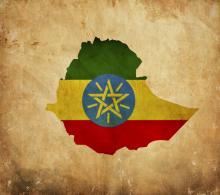
In 2007, I boarded a plane bound for Africa for the first time.
That trip took me to Kenya, Tanzania, the island of Zanzibar, and Malawi.
And that trip changed me — heart, mind, soul — forever transforming my family and my world.
Today, five years almost to the day since I flew to Nairobi to begin my first African adventure, I'm sitting in the international terminal of Dulles airport in Washington, D.C., waiting to board a 787 Dreamliner bound for Addis Ababa, Ethiopia.
An adventure lies ahead. And yet, so much more than that.
I've been to Africa twice now (this is my third visit to continent), and each time the people I've met and experiences I've had on the journey — all of it dripping with a grace so palpable I could almost smell it like so much sandalwood smoke wafting from an incenser — have shaped me and recalibrated my spirit.
I don't know specifically what Ethiopia has in store for me, but I am sure of one thing: The Spirit will be there.
The U.S. jobless rate fell to 7.8 percent in September, the lowest since January 2009, President Obama’s first month in office. The Associated Press reports:
“The U.S. unemployment rate fell to 7.8 percent last month, dropping below 8 percent for the first time in nearly four years. The rate declined because more people found work, a trend that could have an impact on undecided voters in the final month before the presidential election.
“The Labor Department said Friday that employers added 114,000 jobs in September. The economy also created 86,000 more jobs in July and August than first estimated. Wages rose in September and more people started looking for work.”
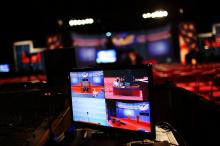
Editor's Note: Tweet @newshour to ask the candidates to #TalkPoverty in Wednesday's debate.
Marianne Williamson, a bestselling author and convener of the upcoming Sister Giant conference on women and politics, has called on President Obama and former Governor Mitt Romney to address “a meaningful array of topics” – including poverty, money in politics and incarceration rates in the U.S. – tonight during the first presidential debate.
Williamson talked to us earlier today about these issues, which are particularly pressing for Christians who take Matthew 25 seriously.
The interview was edited for length and content.
Q: What are you doing to get these issues out there?
A: Having a voice and creating your own platform is not all that difficult with today’s technology. I think what’s happening now is that, firstly, people are realizing that. Secondly, people are realizing that there are certain things that need to be said that simply are not being said as loudly as other things being said. When it comes to a politics of conscience, why wouldn’t we expect that during the debates there would be a conversation about the 23.1 percent of America’s children living in poverty, or the 34 percent of poor children, or the 46 million Americans living in poverty?
A Commonwealth judge this morning blocked a Pennsylvania law requiring a photo ID to vote from being enforced in the upcoming election. The law was one of the most stringent in the country and has sparked a divisive political debate. AP reports:
“A judge on Tuesday blocked Pennsylvania's divisive voter identification requirement from going into effect before Election Day, delivering a hard-fought victory to Democrats who said it was a ploy to defeat President Barack Obama and other opponents who said it would prevent the elderly and minorities from voting.
“The decision by Commonwealth Court Judge Robert Simpson on the law requiring each voter to show a valid photo ID could be appealed to the state Supreme Court.”

Tomorrow night is the first presidential debate. It will undoubtedly be an important moment in the campaign for the highest office in the land. But, whose lives will it be important to?
Certainly, there will be a lot for pundits to discuss and dissect. They will analyze phrases and statements, and will compare them to polling data and focus groups in swing states. Super PACs will record gaffes by either candidate, ready to turn them into multi-million dollar commercial buys.
But, as a person of faith, what I want to know is: how will the words that are said and the positions that are staked out affect the 46 million people in our country living in poverty? What does it mean for the hardworking families who can't put food on the table? Or the 1 in 5 children for whom poverty is an everyday reality and opportunity seems to be an illusion?
Tonight is the world premiere of a film that puts those questions front and center. The Line is a new documentary film from Emmy award-winning writer and producer, Linda Midgett. It tells the stories of real people struggling to make ends meet but still falling below the poverty line. These are stories far too common in our country today and should be a central topic of this debate.
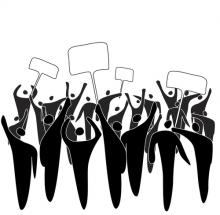
According to Article 19 of the Universal Declaration of Human Rights, “Everyone has the right to freedom of opinion and expression; this right includes freedom to hold opinions without interference and to seek, receive and impart information and ideas through any media and regardless of frontiers.”
Similarly, the First Amendment to the United States Constitution declares “Congress shall make no law…prohibiting the free exercise of; or abridging the freedom of speech…”
While certain opponents exist, most of us agree that free speech is an essential ingredient for a mature democracy, thus it should be encouraged, protected, and further developed. With these thoughts in mind, while we should indeed celebrate the numerous positive outcomes of free speech in the USA, we should also account for its costs, for even the most worthy of causes – such as free speech – bring an assortment of unintended negative consequences.
As our November Election Day draws closer, we are mindful that a defense of free speech has led to millions of dollars directed toward ads, phone calls, literature distribution, and other activities that seek to sway the electorate. As countless studies have shown, the totality of these campaign strategies holds a significant impact on voter decisions and overall turnout.
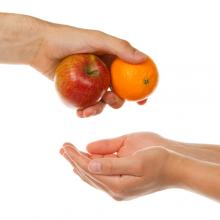
Food assistance programs have been helping millions of people get through the recession. With poverty remaining at record high levels, we should be grateful that these resources are available to protect families from hunger.
Unfortunately, some of our nation’s elected officials see it differently. New legislation (H.R 6518) introduced by Congressman Paul Broun and members of the Republican Study Committee targets some of the very programs designed to protect the most poor and vulnerable. Under the proposed legislation, six food programs administered by the federal government would be combined into a single block grant to states.
Does that sound like Washington slang? What it means is that spending on food programs would be dramatically reduced, administration of these programs would be shifted to state governors, and benefit level would likely vary from state to state. Programs such as the Supplemental Nutritional Assistance Program (SNAP) and Emergency Food Assistance (TEFAP) would be threatened by this legislation.
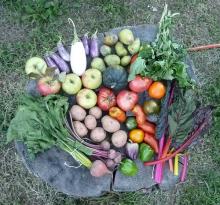
“Another world is not only possible, she is on her way. On a quiet day, I can hear her breathing.”
~ Arundhati Roy
Vegetables.
Who could have imagined an economy in which gentle vegetables were subversive?
But this is our world. A world where a vegetable, whose growth is imperceptible to the naked eye, can spider a crack into the concrete of our industrial food system.
We find ourselves in a food economy that sickens us. Health is divided along race and class lines: the food economy particularly sickens those whose wages do not allow them to buy the foods that can cure us of the diseases industrial “foods” cause.
Corporations, which do not speak the language of human love and health, wrangle to profit from the stream of ill Americans falling from the industrial foods conveyor belt. But we know that type 2 diabetes, heart disease, obesity, and some cancers are fully preventable by replacing part of what we eat with fruits and vegetables.
Why, in a wealthy, fertile country are we wrecking the environment to produce foods that kill us?
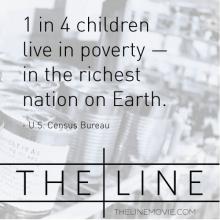
It’s annoying, isn’t it, how American political debate ignores the pressing issues and instead focuses on the trivial? I’m talking about pressing issues like the recently released poverty numbers – nearly 1 in 6 Americans lives in poverty, and the child poverty rate is even higher. That’s 46.2 million people living on less than $23,021 a year for a family of four.
Those are sobering numbers. Here’s another: a new study by Fairness and Accuracy in Reporting shows that of the 10,489 news stories on the campaign this year, just 17 of them addressed poverty in a substantive way. That’s a whopping 0.16 percent of coverage devoted to issues of poverty.
We need to get poverty back on the public agenda. In the richest country in the world, numbers that high should be seen as a moral crisis.
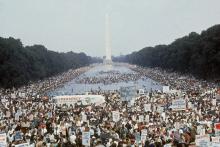
In early 1968, Martin Luther King, Jr., and other civil rights leaders continued plans for a Poor People’s Campaign. It would take place in the spring in Washington, D.C. The poor and those in solidarity with them would take up temporary residence and march peacefully on the Capitol and advocate for substantial anti-poverty legislation from Congress. They would demand jobs, healthcare, and decent housing.
People set up a camp on the Washington Mall and called it Resurrection City. Jesse Jackson gave his famous "I Am Somebody" speech there. But King was assassinated in the weeks leading up to the campaign and Robert Kennedy was assassinated during it. Disheartened and discouraged, people drifted away from the campaign, their dreams deferred.
What if MLK had lived to lead the campaign with his insight and eloquence? What if Bobby Kennedy had lived to support it with his doggedness and political will? Would the United States be a place where 1 out of 5 children, around 15.5 million, are in poverty and where close to 50 million people are without health insurance?
As the faith leaders said yesterday, we have no choice but to respond when we learn that so many of our brothers and sisters are living in poverty. It makes these presidential candidate videos ones that every Christian should watch before they vote.
We asked the candidates, what will you do to address the highest numbers of people in poverty in America in almost 50 years—numbers that we learned today are still growing? We believe these messages from the Presidential candidates should lift the issues of poverty into the national debate into this election season.
We invite members of the press to watch these videos and to question these candidates even further about their visions and policy choices for overcoming poverty. The poverty numbers that came out yesterday require responsible journalists to make the question of poverty an important part of this election year discussion.
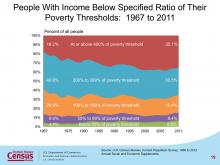
The U.S. Census Bureau released its 2011 poverty report this morning, reporting that 46.2 million people were living in poverty, amounting to 15 percent of the population. Neither was significantly different than 2010. All major demographic categories – white, African-American, Hispanic, Asian – were also essentially the same as last year.
The number of children and the elderly in poverty remained the same.

Being a teacher is like being a farmer. You rise early in the morning. You irrigate and fertilize the field that is your classroom. You plant the seeds that are reading, writing, and arithmetic. You hope for good soil, warm sunshine, and gentle rain that are good homes, healthy foods, and adequate healthcare for your students. You work with your hands, feet and heart with your plants who are your students.
Your harvest is your students.
Your winter season of fallow fields is your summer break of empty classrooms.
It’s the time of year when various government agencies release their reports for the previous year, in this case, 2011. The annual report on poverty is due from the Census Bureau next week, and, according to AP, early reports are that
“The ranks of America's poor are on track to climb to levels unseen in nearly half a century, erasing gains from the war on poverty in the 1960s amid a weak economy and fraying government safety net.”
This week, the U.S. Department of Agriculture released its annual report on household food security. (If you want all the detailed statistical tables, here is the full report.) Not surprisingly, the results showed a growing number people in the U.S. going hungry. 17.9 million households (14.9 percent of households) were “food insecure.” That means at some point during the year, those households did not have enough food due to lack of money. Of those, 6.8 million households (5.7 percent of households and one-third of all food-insecure households) had “very low food security.” That means at some point during the year, some household members went hungry. According to their answers on the survey, these folks reported that “the food they bought just did not last and they did not have money to get more,” and that “an adult had cut the size of meals or skipped meals because there was not enough money for food.”
It is hardly the time to reduce assistance to hungry families, but as McClatchy News noted,
“The survey data comes as congressional Republicans … push for massive cuts in food stamp-program funding to curb enrollment growth and to help balance the federal budget. The Democratic-controlled Senate also voted in June to cut food stamp funding, but by a smaller amount.”
Without programs such as SNAP (food stamps) school lunches, the Women, Infant and Children nutrition program; there would be many more food insecure families in America.
Here’s the data in a helpful infographic from McClatchy.
The Bureau of Labor Statistics released its monthly employment report for August this morning. In the numbers that make the headlines, 96,000 jobs were added and the unemployment rate fell to 8.1 percent – 12.5 million people. The numbers behind the headlines are mixed.
Across the major demographic groups, the unemployment rates for adult men (7.6 percent), adult women (7.3 percent), teenagers (24.6 percent), whites (7.2 percent), blacks (14.1 percent), and Hispanics (10.2 percent) showed little or no change. In the macro picture, 5 million people, 40 percent of those unemployed, are “long-term unemployed” (those jobless for 27 weeks or more.) 8 million people who are considered employed are referred to as “involuntary part-time workers,” meaning they are working part time because their hours have been cut or they are can’t find a full-time job.
But it’s the people who aren’t even counted that give me pause. 2.6 million people are considered “marginally attached to the labor force,” meaning they want work, have looked for a job sometime in the past year, but didn’t look during August. So, they don’t count. Of these, 844,000 are “discouraged workers,” meaning they aren’t looking for work because they believe there are no jobs available for them. They also don’t count.
There is much this country needs and there are people available and willing to do the job. What is lacking is the will to put them to work.
Sister Simone Campbell, executive director of NETWERK, a Catholic social justice group, shares her perspective on the financial challenges facing the nation — and the conversation we should be having.
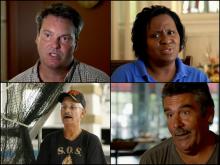
Matthew 25 doesn’t say, “As you have done to the middle class you have done to me."
What it records Jesus saying is, “As you have done to the least of these, you have done to me.” Chances are that will never be the central message of political conventions during election years.
But every four years for the last 40 years (even before we were called Sojourners), our community has done what we can to lift up the issue of poverty during presidential elections. While political party platforms have changed, our commitment to the least of these has not.
So it is with that spirit, this election year, that I am proud to present a new short film called The Line.
Written and directed by Emmy-award winning producer Linda Midgett, it chronicles the very real stories of four real people struggling with real poverty in America today.
You’ll meet a banker in the suburban Midwest who used to earn six-figures a year and now, after the economic collapse, must go to a food bank to feed his three kids; a fisherman on the Gulf Coast of Louisiana who has watched his livelihood and his culture wash away in the wake of Hurricane Katrina and a devastating off-shore oil spill; a blue collar guy in North Carolina who worked hard his whole life but lost his job, became homeless, and started over as a restaurant bus boy; and a single mom in Chicago who battles daily to ensure that her son is safe, healthy, and has the opportunity to go to college.